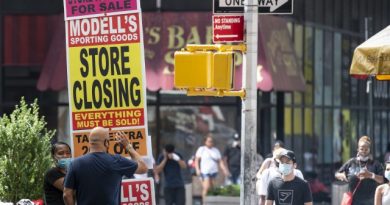Why fashion’s rampant greenwashing is set to expire
On Monday, womenswear brand Frank & Eileen announced that it had become the latest of the relatively small group of fashion brands to have achieved certified B Corp status. The certification came after over a year of intense evaluation by B Corp that “peeled back every layer of our business,” said founder Audrey McLoghlin.
Frank & Eileen finished the process with the second-highest score from B Corp for any fashion brand, following Patagonia. Only 150 of the more than 3,000 global B Corp companies are fashion. For McLoghlin, it was a proud moment for the company and a validation of all the sustainability work that her team does. She posted announcements on the brand’s social media accounts and on its website to make the achievement known.
Moving forward, the e-commerce site will prominently display the brand’s B Corp certification and will include a page detailing what went into earning the certification. McLoghlin said she’s looking for any and all ways to work the brand’s B Corp status into customer-facing messaging.
Like many founders focused on sustainability, McLoghlin has found it hard to stand out for genuine environmental accomplishments. Today, practically every brand includes sustainability as part of its marketing, and there are few rules in the U.S. governing what sustainable claims brands can make. But there are growing efforts to remedy that, both formally and informally.
“I’ve been getting really frustrated with the marketing speak,” McLoghlin said. “Anyone can say they’re sustainable, and the consumer has no idea whether it’s true or not. There’s no one measuring or monitoring. The problem is that, long term, the consumer will grow disappointed and desensitized to these words. Meanwhile, we’ve poured so much time and effort into doing things the right way, from top to bottom.”
Unlike the food industry, which is regulated by the FDA and must meet certain criteria in order to label a product “organic” or “cage-free,” fashion brands have few limits on what they can claim about a product beyond clearing the bare minimum of false advertising laws. The FTC first published guidelines called Green Guides in 1992 that are meant to help guide brands when making environmental claims, but the guides are non-binding and haven’t been updated since 2012. A giant fast-fashion company like H&M or Uniqlo could call themselves a sustainable company for having a few products made from recycled materials, even as thousands more pieces are ending up in a landfill every year.
California has a law in place called the Environmental Marketing Claims Act, passed in the 1990s, that more strictly forbids deceptive marketing, but even that has a maximum fine of just $2,500.
“For better or worse, the claims that fashion brands make use highly ambiguous terms like ‘sustainable’ and ‘clean’ that have no legal definition, which means the companies can define them however they want with no transparency,” said Bonnie Patten, head of the non-profit Truth In Advertising.
But there is some movement on standardizing what brands can say. Compared to the U.S., the European Union is closer to defining strict rules around greenwashing. In December, representatives from France and the Netherlands jointly proposed greenwashing laws to the European Commission that would require European companies to prove claims of sustainability in marketing to the EU’s European Securities and Markets Authority. The EU has been keen on boosting sustainability investments across its member states for the last few years.
Without much guidance from regulatory bodies, brands that want to stand out from the sea of vague sustainability claims have to turn to independent organizations like B Corp and Positive Luxury that give out their own certifications based on certain criteria. Those organizations also charge a certification fee — B Corp’s fee scales with the brand’s revenue and can be as low as $1,000 per year for smaller companies. Otherwise, outside of researching a brand’s practices, informal censures like class action lawsuits and social media criticisms are often consumers’ best bets for evaluating a brand’s sustainability claims. Outerwear brand Canada Goose was hit with the former in February over its allegedly “ethically sourced” fur claim, which was subsequently removed from its website.
“It’s really frustrating that a giant fast fashion company can have one green line or a single green T-shirt and pretend they’re part of the conversation, even if it only makes up 1% of their total business,” said Caroline Danehy, co-founder of swimwear brand Fair Harbor, which is currently in the process of B Corp certification, as well. “B Corp is great, because it’s trusted. But there’s really not much else out there to prove or monitor these claims right now.”
B Corp certifications have been booming over the last decade. In 2007, only 82 brands had B Corp status. New technologies like blockchain are making the traceability of a brand’s materials and supply chain easier, as well, which is valuable — McLoghlin said providing adequate documentation was by far the most difficult part of getting B Corp certified.





